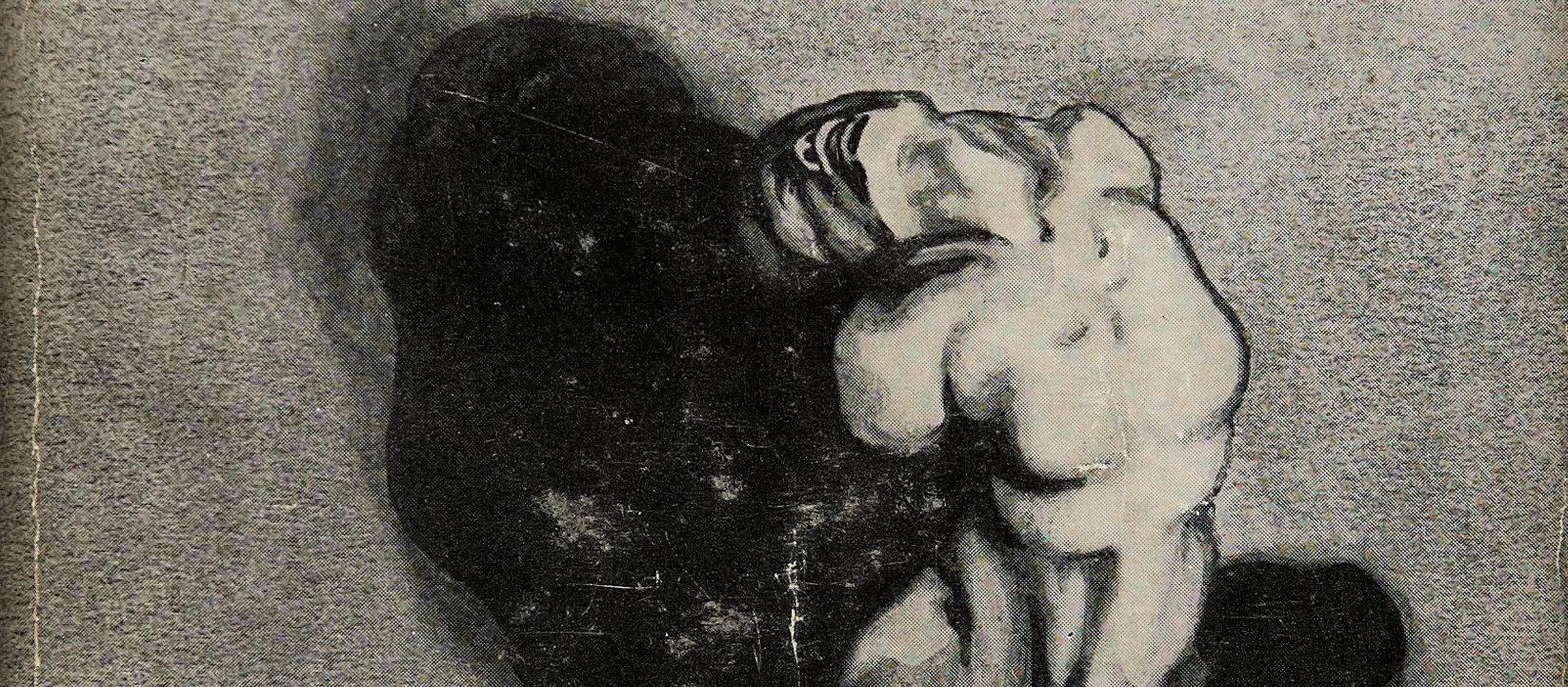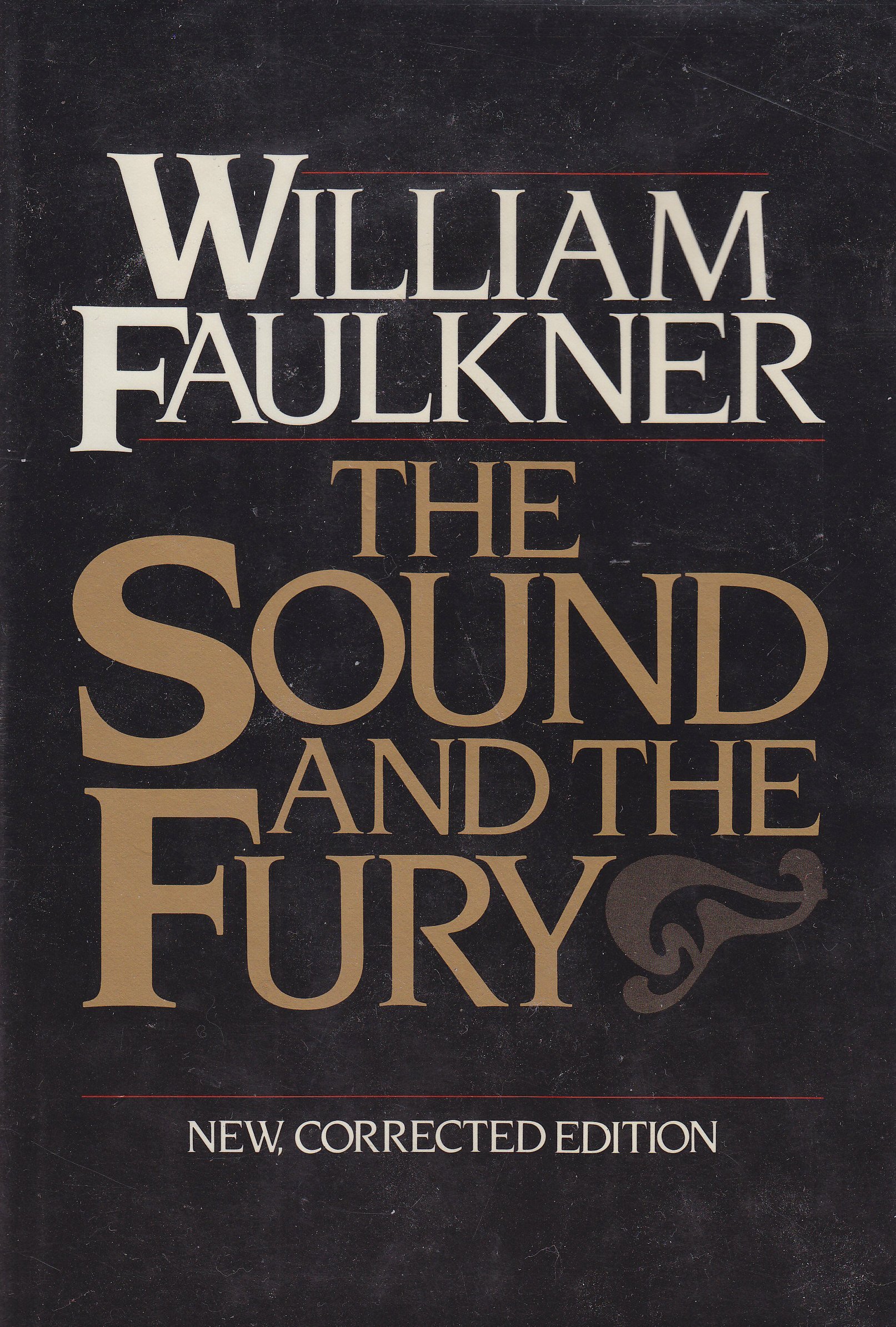

“I could smell the curves of the river beyond the dusk and I saw the last light supine and tranquil upon tideflats like pieces of broken mirror, then beyond them lights began in the pale clear air, trembling a little like butterflies hovering a long way off.”
Several of Faulkner’s works are regarded as American classics, and his reputation was built as much upon his rambling stream-of-consciousness style and use of multiple unreliable narrators (fifteen in the case of the As I Lay Dying) as his thematic content. Similar to As I Lay Dying, the appeal of The Sound and the Fury is not so much in its story as it is in the jumbled and often incoherent thoughts of the central characters that we get to explore, and here we are thrust into three distinct psyches. The three Compson brothers each have a turn narrating a chapter, before Faulkner shifts to a third person omniscient point of view for the concluding fourth chapter.
The novel is depressing and emotionally draining. Suicide, racism, castration, incest, etc. Even as the novel opens with the random thoughts of Benjy—who cannot differentiate between the past and the present—Faulkner’s writing instills a pervasive sense of dread. Reading Benjy’s thoughts is like driving headlong into the sun as it reflects into your eyes and overloads your senses. You can barely distinguish characters—male or female, black or white, first or third generation, stranger or relative. Through the use of italics the timeframe jumps around quite a bit (though Faulkner is purposefully inconsistent in using them); which of Benjy’s caretakers is present helps to indicate the era Benjy is currently thinking about. The entire chapter is a whirlwind, centered around Benjy’s attractions to fire, his first memories of his sister Caddy, and his favorite pasture which had been sold to pay for his brother Quentin’s education. Much of what is actually happening is not clear until later, as the actual text is very impressionistic and meant to convey the thoughts of a mentally handicapped manchild; at times, it was a chore to plow through.
I could hear them talking. I went out the door and I couldn’t hear them, and I went down to the gate, where the girls passed with their booksatchels. They looked at me, walking fast, with their heads turned. I tried to say, but they went on, and I went along the fence, trying to say, and they went faster. Then they were running and I came to the corner of the fence and I couldn’t go any further, and I held to the fence, looking after them and trying to say. […] They came on. I opened the gate and they stopped, turning. I was trying to say, and I caught her, trying to say, and she screamed and I was trying to say and trying and the bright shapes began to stop and I tried to get out. I tried to get it off of my face, but the bright shapes were going again. They were going up the hill to where it fell away and I tried to cry. But when I breathed in, I couldn’t breathe out again to cry, and I tried to keep from falling off the hill and I fell off the hill into the bright, whirling shapes.
The second chapter takes place in the mind of Quentin Compson (who also narrates the short story “A Justice” in The Portable Faulkner as well as Absolom, Absolom!) eighteen years prior to the first chapter. While Quentin’s mind is more developed than Benjy’s, his thoughts are just as incoherent and he is arguably less reliable as a narrator; the first two chapters feel like you’re trying to build a thousand piece jigsaw puzzle without the image on the box as a reference. As a student at Harvard, Quentin cuts class and tries to help a young Italian girl who cannot speak English find her family. Woven into this narrative is the conveyance of his memories of the past deeds of his sister, Caddy, which are cause for contemplation and depression. He is obsessed with his sister’s virginity and purity, and is horrified by her promiscuity, even telling his father that her pregnancy was a result of the two of them committing incest so that he could help her endure the punishment for her sins. “If we could just have done something so dreadful that they would have fled hell except us.” Quentin calls the young Italian girl his sister, and tries unsuccessfully to communicate with her, mirroring his pattern of depression caused by Caddy’s actions. His thoughts move to the downfall of the American South after the Civil War, and his deteriorating state of mind leads to a breakdown in his thought processes—punctuation and grammatical consistency gradually disappear as his mind jumps around haphazardly.
[…] you seem to regard it merely as an experience that will whiten your hair overnight so to speak without altering your appearance at all you wont do it under these conditions it will be a gamble and the strange thing is that man who is conceived by accident and whose every breath is a fresh cast with dice already loaded against him will not face that final main which he knows before hand he has assuredly to face without essaying expedients ranging all the way from violence to petty chicanery that would not deceive a child until someday in very disgust he risks everything on a single blind turn of a card no man ever does that under the first fury of despair or remorse or bereavement he does it only when he has realised that even the despair or remorse or bereavement is not particularly important to the dark diceman and i temporary and he it is hard believing to think that a love or a sorrow is a bond purchased without design and which matures willynilly and is recalled without warning to be replaced by whatever issue the gods happen to be floating at the time no you will not do that until you come to believe that even she was not quite worth despair perhaps and i i will never do that nobody knows what i know and he i think youd better go on up to cambridge right away you might go up into maine for a month you can afford it if you are careful it might be a good thing watching pennies has healed more scars than jesus and i suppose i realise what you believe i will realise up there next week or next month and he then you will remember that for you to go to harvard has been your mothers dream since you were born and no compson has ever disappointed a lady and i temporary it will be better for me for all of us and he every man is the arbiter of his own virtues but let no man prescribe for another mans wellbeing and i temporary and he was the saddest word of all there is nothing else in the world its not despair until time its not even time until it was
The third chapter takes place a day after the first chapter and is told from the perspective of the third brother, Jason Compson IV. His narrative is the easiest to follow, and illuminates much of the previous two chapters. We understand why Quentin was so depressed, and many of Benjy’s unframed outbursts become comprehensible. Although Jason is clearly driven by a desire for material wealth, he also suffers as provider for his hypochondriac mother, his adult child brother Benjy, and his sister Caddy’s illegitimate child (who is also named Quentin). Although the first two chapters are incredibly difficult to read, without the unique style which emphasizes the mental states of Benjy and Quentin, Jason’s horror and the tragic events detailed in the appendix would lack the emotional impact that is produced by slogging through their broken minds. As with As I Lay Dying, the power of The Sound and The Fury does not lie solely, or even primarily, in the story it tells, but is inherently bound up in its form as well. If every loose end were resolved, and the story told in a straightforward, factual manner, it would mean almost nothing.
The fourth chapter is the only one without first person narration, and focuses on Dilsey, the matriarch of the black servant family (this section of the novel is repurposed for use in The Portable Faulkner). The heated relationship between Jason and the female Quentin boils over and Benjy becomes hysterical when Dilsey’s grandson Luster takes the wrong route with the carriage after taking him to the colored church on Easter Sunday. Dilsey weeps during the sermon when she realizes that she is witnessing the destruction of the Compson family.
The Sound and The Fury is almost too clever for its own good and is hard to appreciate at times while reading it. It is a challenge to get through and requires patience as the story slowly comes together via disjointed and seemingly aimless tangents. But piecing together these fractured thoughts imparts more than the family melodrama that provoked them; like many difficult things that we remember fondly in time, the struggle to comprehend the Compson’s tragic story is what makes it memorable.